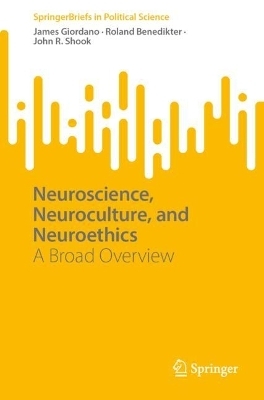
Neuroscience, Neuroculture, and Neuroethics
Springer International Publishing (Verlag)
978-3-031-74023-7 (ISBN)
- Noch nicht erschienen - erscheint am 15.01.2025
- Versandkostenfrei
- Auch auf Rechnung
- Artikel merken
Contemporary brain research is challenging Western societal norms by questioning basic cornerstones such as individuality, freedom, rationality, solidarity, and the concept of the human being in general. It is giving way to profound changes in Western concepts of culture and civilization. This volume provides a broad overview of the cultural changes incurred by neuroscience and neurotechnology, and explores the evolving fields of neuroeconomics, neuroreligion, neuropolitics, and neuroethics. It takes a multi-disciplinary approach in explaining how neuroscience and neurotechnology will affect society, and illustrates how these tools and methods are being used in research and ever-expanding practices in varying fields.
Praise for Neuroscience, Neuroculture, and Neuroethics: A Broad Overview
"Giordano, Benedikter and Shook provide an accessible, timely, and engaging introduction to the main challenges of neuroscience and neurotechnology for individuals and society. It is impressively wide-ranging, insightfully examining philosophical, cultural, political, and economic dimensions of brain science. An especially fascinating aspect of the book is discussion of the implications of bioenhancement for transhumanism and how it could influence how we define who we are."
--Walter Glannon, Professor Emeritus of Philosophy, University of Calgary, Canada
"This book provides an excellent survey about the challenging 'Neuro-World'. It reflects the different perspectives which are relevant for modern societies. It is full of information to gather additional knowledge on an international and interdisciplinary level."
--Prof. Dr. Ernst Pöppel, Professor of Medical Psychology, Ludwig Maximilian University (LMU) of Munich, Germany
"This engaging and highly accessible book offers an excellent short introduction to the powerful impact of neuroscience and neurotechnology upon modern societies. Covering a broad range of issues and perspectives from neuroscience, social science, philosophy, and ethics, it is eminently suitable for teaching and provides a thought-provoking basis for further discussions."
--Kathinka Evers, Professor of Philosophy, Senior Researcher in Philosophy at the Centre for Research Ethics & Bioethics (CRB) at Uppsala University, Sweden; and Professor Ad Honorem at the Universidad Central de Chile
James Giordano is the Pellegrino Center Professor in the Departments of Neurology and Biochemistry, Chief of the Neuroethics Studies Program, and Co-Director of the Program in Brain Science and Global Health Law and Policy at Georgetown University Medical Center, Washington, D.C., USA. Dr. Giordano is also Senior Bioethicist of the US Department of Defense Medical Ethics Center and Visiting Professor of Psychiatry at the Uniformed Services University of Health Sciences, Bethesda, MD, USA. His ongoing research addresses the mechanisms and treatment of neuropsychiatric spectrum disorders, and neuroethical issues arising in and from the development, use, and misuse of neuroscientific techniques and neurotechnologies in medicine, public life, global health, and military applications. He has authored over 350 peer-reviewed papers, 8 books, and 50 government reports in neuroscience, neuroethics, and biosecurity. He is Chair Emeritus of the Neuroethics Program of the IEEE Brain Project; and an elected member of the European Academy of Science and Arts.
Roland Benedikter is Co-Head of the Center for Advanced Studies of Eurac Research, Bolzano/Bozen, Italy; UNESCO Chair in Interdisciplinary Anticipation and Global-Local Transformation, Paris, France; and Ordinary Member of the European Academy of Sciences and Arts, Salzburg, Austria. Dr. Benedikter's research interests include big picture topics such as humanity, inter- and trans-disciplinary societal transformation, futures literacy, globalization & area studies, re-globalization and evolution of global institutions, glocalization, new human technologies, and man-machine convergence. He is author and editor of more than 300 publications and over 25 books on international and global strategic issues.
John R. Shook teaches philosophy at Bowie State University in Maryland, USA and Georgetown University in Washington D.C., USA. He has been a visiting fellow at the Institute for Philosophy and Public Policy at George Mason University in Virginia, USA and the Center for Neurotechnology Studies of the Potomac Institute for Public Policy in Virginia, USA. Dr. Shook's primary research areas include philosophy of science, pragmatism, philosophical psychology, neurophilosophy, social neuroscience, moral psychology, neuroethics, and science-religion dialogue. He has authored and edited more than a dozen books and dozens of articles in academic journals.
1 Introduction. Neuroscience, Neuroculture, Neuroethics: What, why and whereto?.- 2 Neuro-Futures: Programs and Impacts of Neuroscience and Neurotechnology.- 3 Neuro-Enhancement: Brain-Machine Interfaces (BMIs) and their Applications.- 4 Neuro-Ethics: Holism, Preparedness and Precautions.- 5 Neuro-Politics: New Frontiers for Policy and Strategy.- 6 Neuro-Civics: Are Civic Institutions Ready for Moral Bioenhancement?.- 7 Neuro-Economics: Understanding the Future Socio-Economic Sphere.- 8 Neuro-Anthropology: Towards A "Posthuman" Technological Self?.- 9 Neuro-Philosophy: "Post-Humanistic" Thought and Brain-Mind Dualism.- 10 Neuro-Realism: Towards a Balanced Ideology Between Empiricism and Subjectivity.- 11 Neuro-Transhumanism: Questions and Answers.- 12 Afterword. Neuroscience, Neuroculture, Neuroethics: A Futures Field on the Rise. How to proceed?.
| Erscheint lt. Verlag | 15.1.2025 |
|---|---|
| Reihe/Serie | SpringerBriefs in Political Science |
| Zusatzinfo | XII, 166 p. |
| Verlagsort | Cham |
| Sprache | englisch |
| Maße | 155 x 235 mm |
| Themenwelt | Medizin / Pharmazie ► Allgemeines / Lexika |
| Sozialwissenschaften ► Politik / Verwaltung ► Politische Theorie | |
| Technik ► Umwelttechnik / Biotechnologie | |
| Schlagworte | Anticipatory Innovation Governance (AIG) • Brain-computer interfaces (BCIs) • Brain-Machine-Interfaces (BMIs) • human enhancement technologies (HET) • Moral bioenhancement • neuro-anthropology • Neuro-bioeconomy • Neuromodulation • Neuro-prosthetics • Post-humanism |
| ISBN-10 | 3-031-74023-8 / 3031740238 |
| ISBN-13 | 978-3-031-74023-7 / 9783031740237 |
| Zustand | Neuware |
| Haben Sie eine Frage zum Produkt? |
aus dem Bereich


